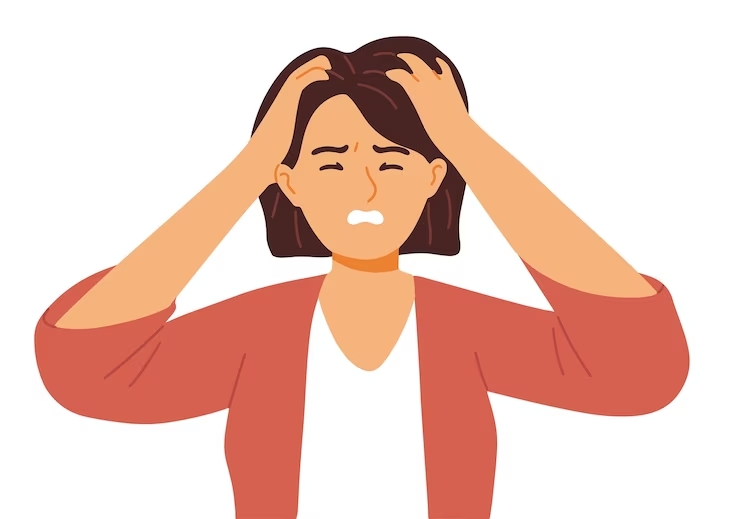ANXIETY Counselling

ANXIETY – WHAT IS ANXIETY.?
In simple language Anxiety means lack of knowledge/information in the area of concern like Self-behaviour, Emotions, Personality, Attitude, Habits, etc. which becomes reason of uneasiness, stress & anxiety
Anxiety is a normal and often healthy emotion. However, when a person regularly feels disproportionate levels of anxiety, it might become a medical condition. Anxiety disorders form a category of mental health diagnoses and are characterized by feelings of fear, worry, and unease that are strong enough to interfere with daily activities. These feelings are usually accompanied by physical symptoms such as a rapid heartbeat, sweating, and difficulty breathing.
There are several types of anxiety disorders, including generalized anxiety disorder, panic disorder, and specific phobias. Treatment for anxiety disorders typically involves therapy, medication, or a combination of both.
SYMPTOMS OF ANXIETY
The symptoms of anxiety can vary from person to person, but common symptoms include:
- Constant worry or fear
- Avoiding certain situations or places because they trigger anxiety
- Restlessness or feeling on edge
- Fatigue
- Difficulty concentrating
- Irritability
- Muscle tension or muscle aches
- Sleep disturbance, such as difficulty falling or staying asleep
- Nausea, diarrhea, or other digestive problems
- Rapid heartbeat or palpitations
- Shortness of breath or tightness in the chest
- Lightheadedness or dizziness
- Hot flashes or chills
- Trembling or shaking
- Numbness or tingling sensations
It’s important to seek professional help if you’re experiencing any of these symptoms, as they can have a significant impact on daily life and overall well-being. A mental health professional can help diagnose the cause of your symptoms and recommend appropriate treatment options.
TYPES OF ANXIETY DISORDERS There are several types of anxiety disorders, including:
- Generalized Anxiety Disorder (GAD)– characterized by excessive, unrealistic worry and tension, even if there is little or nothing to provoke it.
- Panic Disorder – characterized by sudden and repeated attacks of intense fear. These panic attacks can lead to physical symptoms such as sweating, chest pain, and a rapid heartbeat.
- Social Anxiety Disorder (Social Phobia)– intense fear of being embarrassed, humiliated, or judged by others in social situations.
- Specific Phobias– intense fear of specific objects or situations, such as flying, heights, or animals.
- Obsessive-Compulsive Disorder (OCD) – characterized by unwanted and intrusive thoughts (obsessions) that lead to repetitive behaviours (compulsions).
- Post-Traumatic Stress Disorder (PTSD) – a type of anxiety disorder that can develop after exposure to a traumatic event, such as military combat, natural disasters, or sexual assault.
- Separation Anxiety Disorder – excessive fear or worry about separation from those to whom one is attached.
It’s important to note that having symptoms of anxiety does not necessarily mean you have an anxiety disorder. A mental health professional can diagnose an anxiety disorder and recommend an appropriate treatment plan.
CAUSES OF ANXIETY The exact cause of anxiety disorders is not fully understood, but a number of factors can contribute to their development, including:
- Genetics: Anxiety can run in families, suggesting a genetic component to its development.
- Brain chemistry:Abnormal levels of certain neurotransmitters, such as serotonin and dopamine, may contribute to anxiety disorders.
- Life experiences: Traumatic or stressful life events, such as abuse, the death of a loved one, or financial problems, can increase the risk of developing an anxiety disorder.
- Medical conditions: Chronic medical conditions, such as heart disease or diabetes, can increase the risk of developing anxiety.
- Substance abuse:Substance abuse, such as alcohol or drug abuse, can worsen symptoms of anxiety or trigger the onset of an anxiety disorder.
- Withdrawal from drugs or alcohol: Stopping the use of certain drugs, such as benzodiazepines or alcohol, can lead to withdrawal symptoms that include anxiety.
- Parental Training & Family Environmental Factors: play important role during formative/growing age of children.
It’s important to note that multiple factors can contribute to the development of an anxiety disorder, and each person’s experience is unique. A mental health professional can help determine the specific factors that may be contributing to your symptoms and develop an appropriate treatment plan.
OVERCOMING ANXIETY WITH ONLINE/OFFLINE COUNSELING – How to Recover?
Online or offline counselling can be a highly effective way to overcome anxiety. A mental health professional can provide you with support, guidance, and tools to help you manage your anxiety symptoms. Some common approaches to treating anxiety through counselling include:
- Cognitive-behavioural therapy (CBT)– a form of therapy that focuses on identifying and changing negative thought patterns that contribute to anxiety.
- Exposure therapy – a type of therapy that gradually exposes a person to the object or situation they fear in a controlled and safe environment.
- Meditation/Mindfulness-based approaches– techniques that help you become more aware of your thoughts, feelings, and physical sensations in the present moment.
- Medication management – in some cases, prescription medications, such as antidepressants or anti-anxiety drugs, can be prescribed to help manage anxiety symptoms.
Online counselling, or teletherapy, can be a convenient option for individuals who prefer the privacy and flexibility of receiving therapy from the comfort of their own homes. Offline counselling, or in-person therapy, can be a good option for those who prefer the personal connection and face-to-face interaction with a therapist. The type of counselling that is best for you will depend on your individual needs and preferences. A mental health professional can help you determine the best approach for you and develop a treatment plan that meets your unique needs and goals.
ADVANTAGES OF ONLINE COUNSELING Online counselling, also known as teletherapy or virtual therapy, offers several advantages, including:
- Convenience:Online counselling allows you to participate in therapy from the comfort of your own home or from any location with internet access.
- Accessibility:Online counselling can be especially beneficial for individuals who live in rural or remote areas, or for those who have mobility issues that make it difficult to travel to a therapist’s office.
- Flexibility:Online counselling sessions can often be scheduled at times that are convenient for you, including evenings and weekends.
- Comfort: Some individuals may feel more comfortable discussing personal and sensitive issues in an online setting, as it allows them to have greater control over the pace and flow of the session.
- Cost-effectiveness: Online counselling can often be more affordable than in-person therapy, as therapists do not need to maintain a physical office.
- Record-keeping:Online counselling platforms typically provide secure and confidential online storage of session notes and other therapy-related materials, which can be a useful resource for tracking progress and growth.
It’s important to note that online counselling may not be suitable for everyone, and some individuals may prefer the personal connection and in-person interaction of traditional therapy. A mental health professional can help you determine whether online counselling is the right option for you and assist you in finding a qualified and reputable therapist.
HOW ONLINE COUNSELING WORKS- Online counselling.? Online counselling at PSY-FI SOLUTIONS typically works through a secure, online platform that allows you to have virtual therapy sessions with a mental health professional. Here’s a general overview of how the process works:
- Finding a therapist: You can start by searching for qualified and licensed mental health professionals who offer online counselling services. Many therapists have websites that describe their services, specialties, and background information.
- Scheduling a session: Once you have found a therapist you feel comfortable with, you can schedule a session online. You and your therapist will agree on a time and date for the virtual session.
- Joining the session: At the agreed-upon time, you will log in to the online platform and join the virtual session. Most platforms use video conferencing software, such as Zoom, to conduct the session.
- Conducting the session: The session will be conducted just like an in-person therapy session. You will be able to see and hear your therapist, and they will be able to see and hear you. You will discuss your concerns and work together to develop strategies to manage your anxiety or other issues.
- Ending the session:At the end of the session, you and your therapist will discuss any follow-up actions and schedule a time for your next session.
It’s important to choose an online/offline counselling platform that provides a secure and confidential environment to ensure the privacy of your therapy sessions. A mental health professional can help you determine which platform is best for you and assist you with the setup process.
Join us to help you to live stress-free life!
